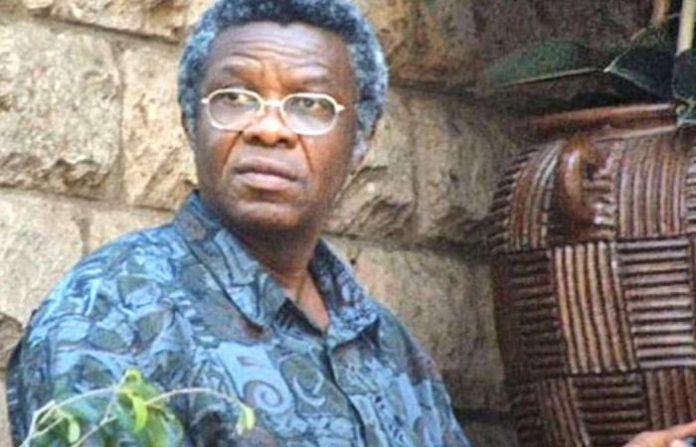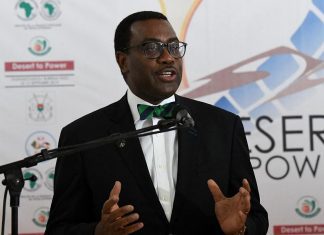Rwandan genocide fugitive Felicien Kabuga, whose arrest on Saturday ended 26 years on the run, was a frail, elderly man who said little to neighbours and who would take a stroll most days outside of his apartment in a well-off suburb of Paris.
Kabuga, 84, Rwanda’s most wanted man with a $5 million bounty on his head, had been living under a false name in a five-storey apartment block in Asnieres-sur-Seine with the help of his children, according to France’s justice ministry.
Police detained him early on Saturday.
“I would see this man going out, maybe once a day, alone or with someone,” said Jean-Yves Breneol, 72, a resident in the same block where Kabuga lived. “He wouldn’t say a word, nothing.”
Breneol said he thought Kabuga might have lived in the building for four or five years.
“We didn’t know his name, nothing,” he continued.
It is not known how or when Kabuga entered France.
But neighbours said they were stunned to learn that a man wanted by a United Nations tribunal on seven criminal charges including genocide and incitement to commit genocide, all in relation to the 1994 Rwandan genocide, had been living among them.
“What’s happened is shocking,” said a second resident in the building who identified himself only as Jean-Guillaume, who added that Kabuga appeared weak.
“He was an old man, very old. He was sick.”
Reuters could not find any public comment made by Kabuga over the years about the charges. It was not immediately known if he has a lawyer in France.
Kabuga is now being held in La Sante prison in central Paris.
At the foot of an imposing outer wall made of stone and bristling with security cameras, a coat of arms in the tricolor of the French national flag hangs beside a reception kiosk.
CASH, MACHETES
Kabuga’s arrest marked the end of a more than two-decade long hunt that spanned Africa and Europe.
A Hutu businessman, he is accused of creating and making contributions to a fund that raised finances to pay the youth militias that would slaughter some 800,000 Tutsis and moderate Hutus, as well as importing huge numbers of machetes, according to the UN tribunal’s indictment.
Kabuga had been an associate of president Juvenal Habyarimana, whose death in a plane shot down over the Rwandan capital Kigali in 1994 ignited the deep-rooted ethnic tensions between the Hutus and Tutsis. Two of his daughters married into Habyarimana’s family, according to an amended indictment dated 2004.
One of Rwanda’s richest men before the genocide, Kabuga controlled many of the central African nation’s coffee and tea plantations and factories. He also co-owned Radio Television Milles Collines, whose radio station broadcast anti-Tutsi messages that fanned the ethnic hatred.
The scars of the genocide remain deeply etched in the Rwandan psyche.
“This is really good news that someone who planned and financed the genocide and has been hiding for a long time and now arrested. It is good news for everyone especially survivors,” said Valerie Mukabayire, leader of AVEGA, a group of women survivors of the genocide.
Mukabayire, 64, said she lost family members including her husband. Her survivors’ group has slightly over 19,000 members.
“We were worried that his (Kabuga’s) elderly age would impede justice but now we are happy that he is arrested,” she told Reuters by phone.
Kabuga’s arrest paves the way for him to come before the Paris Appeal Court and later be transferred to the custody of the international court, which is based in the Hague, Netherlands and Arusha, Tanzania.
The International Criminal Tribunal for Rwanda (ICTR) was established by the U.N. Security Council and closed in 2015. The International Residual Mechanism for Criminal Tribunals is now mandated to perform some functions carried out by the ICTR and the International Criminal Tribunal for the former Yugoslavia.
The ICTR was at the centre of efforts to set new standards in international justice, though Rwandan President Paul Kagame said it was too slow and too inefficient. Some critics said it was too focused on prosecuting Hutus.
“For international justice, Kabuga’s arrest demonstrates that we can succeed when we have the international community’s support,” Mechanism Chief Prosecutor Serge Brammertz said in a statement.
Join Television Nigerian Whatsapp Now
Join Television Nigerian Facebook Now
Join Television Nigerian Twitter Now
Join Television Nigerian YouTUbe Now





